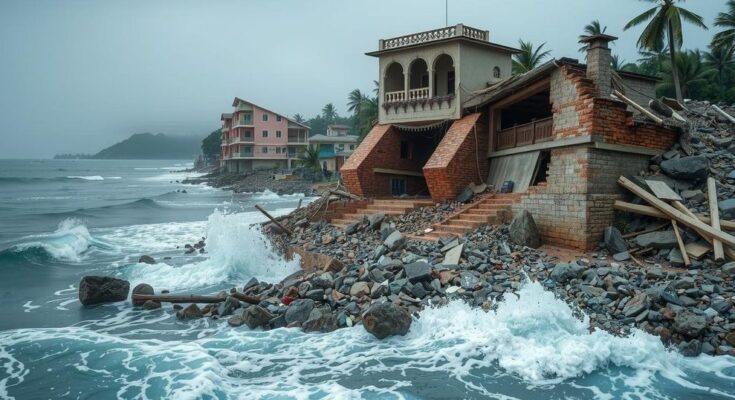The article reflects on the enduring impact of the 2004 tsunami, which resulted from a 9.1 magnitude earthquake, highlighting survivor testimonials and the ongoing challenges in rebuilding lives and communities in Tamil Nadu, India. Despite recovery efforts, many continue to suffer from emotional scars and infrastructural issues.
NAGAPATTINAM, India (AP) — On the morning of December 26, 2004, a magnitude 9.1 earthquake struck off the coast of Sumatra, sending a powerful tsunami crashing across the Indian Ocean, wreaking havoc from Indonesia to India. For Yusuf Ansari, then a young boy playing cricket on the beach, the day transformed tragically as he witnessed the sea turn ominous. Now, at 32, he recalls, “Out of nowhere, we saw a boat tossed by the waves… Everyone around panicked.” This catastrophic event claimed approximately 230,000 lives in a dozen nations, with India losing 10,749 lives, primarily in the southern state of Tamil Nadu.
The annual remembrance of this disaster sees fishermen and community members offering tributes, as they honor the countless lives lost. Jaya, a survivor from Tamil Nadu, recounts the chaos of that day, reflecting on her husband, who was fishing at sea while she remained home with their young children. “The boys were playing near the shore… Waves started rising higher and higher,” she stated, highlighting the panic that ensued.
In the aftermath, efforts to rebuild and restore affected communities were undertaken by the Tamil Nadu government in collaboration with organizations such as the Asian Development Bank and the World Bank. New infrastructure was established, including housing projects that offered improved amenities. However, challenges persist. Kuppi Ratnam, a fisherman, noted, “The stones don’t hold up anymore… We’ve asked the government to fix it, but the problem remains.” He emphasized the hardships faced by families who were unable to return or rebuild due to emotional and financial barriers.
Today, two decades later, the scars left by the tsunami remain indelibly etched in the minds and lives of those who survived, reminding them of the fragility of life and the ongoing struggle for recovery following such a catastrophic event.
The article examines the long-lasting impact of the December 26, 2004 tsunami, which followed a devastating 9.1 magnitude earthquake. This disaster is remembered as one of the deadliest natural calamities in history, significantly affecting multiple countries, with Tamil Nadu, India, experiencing severe loss. The government and various organizations made concerted efforts for rehabilitation and infrastructure development, yet many survivors still grapple with the emotional and physical scars of that day, facing challenges in rebuilding their lives.
In summary, the 2004 tsunami, triggered by a powerful earthquake, remains etched in the collective memory of those affected in India, particularly in Tamil Nadu. While reconstruction efforts have been made, the emotional toll and challenges in recovery continue to impact survivors like Yusuf Ansari and Jaya. The annual commemorations serve as poignant reminders of both the tragedy and the resilience of the affected communities.
Original Source: www.mymotherlode.com




